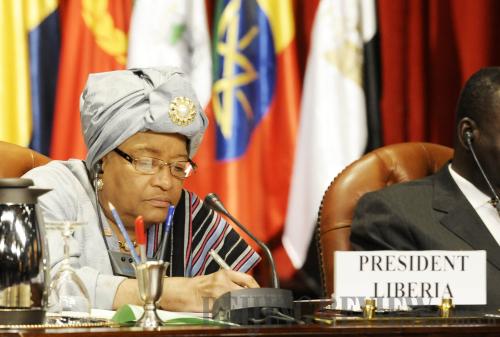|
 |
|
WE DID IT: ANC supporters celebrate South African Nelson Mandela Day (XINHUA/AFP) |
 |
|
PROGRESS: Ellen Johnson Sirleaf, Africa's first female president (ZHANG NING) |
Fifty years ago, 17 African countries announced independence from colonial rule and 1960 became known as the African Independence Year. After independence, African countries underwent various changes both politically and economically. Some countries like Mauritius and Botswana have found ways of shaking off poverty and focusing on development; some have adopted democratic election systems and are in the process of peaceful and stable development, such as Ghana and Cameroon; and some like Nigeria, Sudan and Angola are experiencing economic takeoffs, while others such as Somalia and Democratic Republic of Congo are still caught up in wars and conflicts caused by political, economic, ethnic and religious contradictions.
Achievements
Generally, Africa has achieved great progress in its development during the 50 years after independence in areas such as the establishment of modern state regimes, operation of economic systems, improvement of education and consolidation of civil societies. Besides these, great achievements have been made in the following areas in Africa:
Regional integration. Africa took only 50 years to move at a fast pace from a continent devastated by the slave trade, torn by colonialism and limited by the international community, toward integration. The establishment of the African Union is a tremendous achievement in regional integration.
Gender equality. Though African countries are often singled out by Western countries as targets in human rights issues, Africa's achievements in this aspect are undoubtedly positive, especially in gender equality. African women maintained great progress in human rights after the continent's independence. Besides the right to vote, some African women became chair of the UN General Assembly in the late 1960s, cabinet ministers in the 1970s and Nobel Prize winners. In 2005, Ellen Johnson Sirleaf was elected as Liberian President, becoming the first woman state president in Africa.
Border stability. The borders between African countries were determined during the period of colonialism, which separate some African ethnic groups. Technically, this colonial heritage would have led to numerous border conflicts and wars. However, during the 50 years after independence, only a few border-related conflicts took place, mainly because of cross-border ethnic groups. The Charter of the Organization of African Unity (OAU) and other related documents also have clear stipulations regarding respecting the existing borders. The OAU's advisable efforts successfully avoid numerous possible conflicts caused by irrational borders determined during colonialism.
|